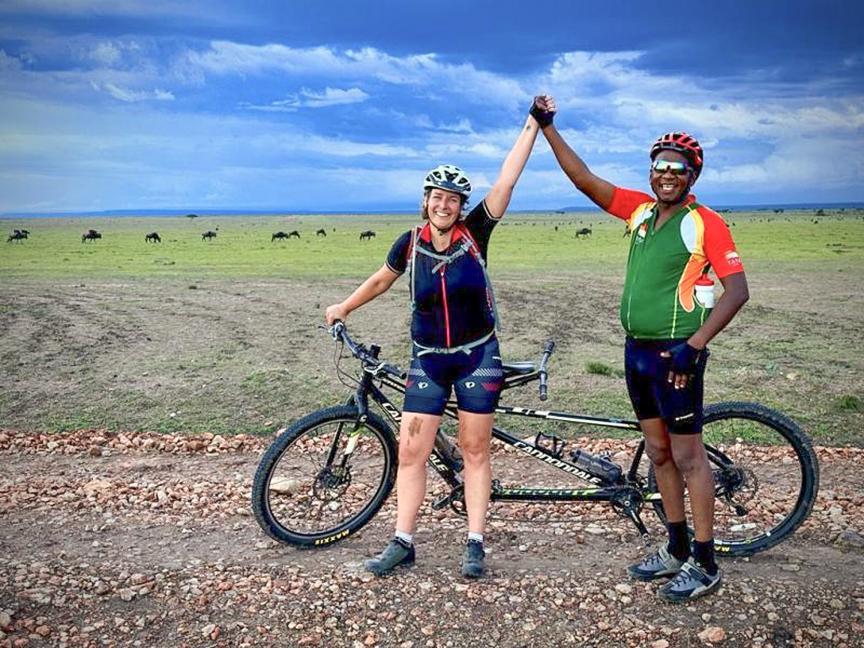 Natalie Plhak/Light for the World
Natalie Plhak/Light for the World
Stanley Mutuma – embracing inclusion in Kenya
Stanley Mutuma is Secretary General of the Kenya National Paralympic Committee. Stanley, a lawyer, is blind and knows what an important role sport plays in inclusion.
When Stanley Mutuma, 41, sits on his bicycle – a tandem – he feels accepted and free. ‘It’s absolutely fantastic, a feeling of friendship and adventure,’ he says. Mutuma, a lawyer and Secretary General of the Kenya National Paralympic Committee, is a keen cyclist. He can gain a sense of the landscape he rides through with friends from the type of surface, how steep the ground is, the smells and the differences in temperature.
Mutuma has been blind for 26 years after surviving a terrorist attack by the Islamist militant organisation Al-Qaeda on the US Embassy in Nairobi. On 7 August 1998, shortly after the bomb was detonated in the Kenyan capital, a second bomb exploded in front of the US Embassy in the coastal city Dar es Salaam in neighbouring Tanzania. More than 200 people died in the attacks, of whom 176 were Kenyans who had no connection whatsoever to the US Embassy. Around 4,000 people were injured, some of them seriously.
As a lawyer, Mutuma has been advocating for compensation from the US Government for the Kenyan victims of the attack for many years now. Up until now, only US victims have received compensation.
Mutuma was 16 years old at the time and was on his way to a school drama festival near the US Embassy when the bomb exploded. Doctors in Kenya and the UK spent four years trying to save the teenager’s sight. His family had to pay most of the costs. When it became clear that he would not regain his sight, Mutuma began building a new life for himself. He attended a school for blind students and completed his secondary education with such excellent marks that he qualified to study law.
IT as the key to inclusion
He passed his university degree at the public University of Nairobi with top marks too. Although the university staff had little experience of dealing with blind students to begin with, Mutuma recalls, they were always helpful and willing to learn and his fellow students also supported him. However, the key to successful inclusion was IT, he explained: ‘The language apps and other aids mean that it is now possible to move around completely autonomously and independently.’
 Mutuma/Godeke
Mutuma/Godeke
Stanley Mutuma out and about with tandem pilot Jeanet Godeke.
Kenya’s constitution bans discrimination
Mutuma believes that Kenya has made major progress in the area of inclusion over the past 10 to 15 years and that many things have improved due to the work that civil society organisations have done to raise awareness, ‘even if we are still far from achieving comprehensive equal rights for people with and without disability.’ However, it is certainly helpful that the legal position in Kenya is clear, says Mutuma: Kenya’s Constitution of 2010 bans discrimination on any ground, including sex, ethnic origin, disability or religion.
‘Cycling in tandem is absolutely fantastic, a feeling of friendship and adventure.’
Rebuilding a life through sport
Sport played a major role for Mutuma in rebuilding his life. He discovered through another survivor of the terrorist attack of 1998 how beneficial sport can be, giving him a new physical awareness and a strong sense of community and enabling him to achieve recognition. He reached international level in competitive cycling and represented Kenya in races – on a tandem as part of a team with a sighted ‘pilot’. He now cycles as a hobby.
Mutuma’s own experience has taught him how important sport is for athletes with a disability. As Secretary General of the Kenya National Paralympic Committee, he is supporting other athletes to help them demonstrate their talent at the Paralympic Games in Paris in August and September 2024. In the Kenyan team, the para athletes are now treated the same as those without a disability, says Mutuma, which he believes is already a huge success even before the first medal is won.